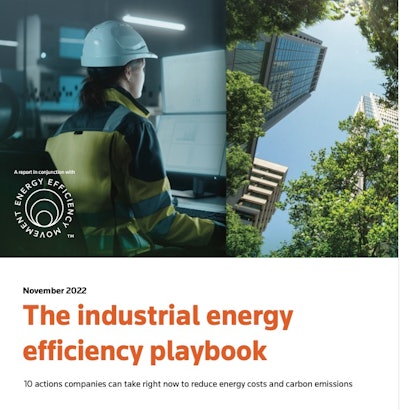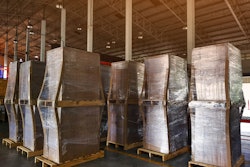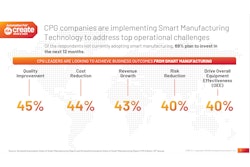
This content was written and submitted by the supplier. It has only been modified to comply with this publication’s space and style.
The playbook provides industrial companies, who account for 42% of electricity demand, 10 tangible actions to reduce energy costs and carbon emissions – e.g., digital energy monitoring and sensors, right-sizing industrial machines with high-efficiency motors and variable speed drives, artificial intelligence to analyze building use patterns and adjust temperatures, and other measures.
• Independent report highlights 10 actions to help industrial users improve their energy efficiency right now
• Improving energy efficiency will reduce energy bills and emissions substantially in the short- to mid-term, without compromising productivity
• Industry is the world’s largest consumer of electricity, natural gas and coal, and accounts for 42% of electricity demand
With businesses around the world facing unprecedented pressure from the cost of energy and the urgency of climate change, a new report from the Energy Efficiency Movement shows that improving industrial energy efficiency is the fastest and most effective way for a business to cut energy costs and greenhouse gas emissions. The Energy Efficiency Movement is a global forum of around 200 organizations sharing ideas, best practices and commitments to create a more energy-efficient world.
The “Industrial energy efficiency playbook” includes 10 actions that a business can take to improve its energy efficiency, reduce energy costs and lower emissions right now. It focuses on mature, widely available technology solutions that will deliver rapid results and ROI – and are capable of being deployed at scale.
“Energy efficiency is a win-win for companies and the climate,” said Kevin Lane, senior program manager, energy efficiency, with the International Energy Agency (IEA). “While industry needs to address climate change on all fronts – such as increasing use of renewable energy, investing in low-carbon processes and developing circular business models – energy efficiency stands out as the business-focused opportunity with the best near-term prospects for emission reductions. The 10 actions contained in this report are known, cost-effective resources, and can be employed at scale rapidly to help companies convert climate ambition into action.”
Organizations interviewed for the report include ABB, Alfa Laval, DHL Group, the IEA, Microsoft and ETH Zürich, the Swiss federal institute of technology. The contributors’ recommendations range from carrying out energy audits to right-sizing industrial machines that are often too big for the job at hand, which wastes energy. Moving data from on-site servers and into the cloud could help save around 90% of the energy consumed by IT systems. Speeding up the transition from fossil fuels, by electrifying industrial fleets, switching gas boilers to heat pumps or using well-maintained heat exchangers will also offer efficiencies.
Further actions involve installing sensors and real-time digital energy monitoring to reveal the presence of so-called “ghost assets” that use power when on stand-by, unlike a digital twin that can simulate efficiency actions without interrupting production. Using smart building solutions to control power systems, lighting, blinds and heating, ventilation and air conditioning (HVAC) will also save energy in industrial facilities.
Other recommendations include installing variable speed drives which can improve the energy efficiency of a motor-driven system by up to 30%, yielding immediate cost and emissions benefits. If the more than 300 million industrial electric motor-driven systems currently in operation were replaced with optimized, high-efficiency motors, global electricity consumption could be reduced by up to 10%.
“There are energy efficiency solutions available that can help industry mitigate climate change and drive down energy costs, without compromising performance and productivity,” said Tarak Mehta, president, Motion business area at ABB. “With recent technology advances in energy efficiency, the improvement potential in industry is significant and readily available. So, rather than turning the lights off and halting production to save money, this important new report explains practical steps executives can take to reduce energy use and their bills while maintaining current operations.“

























